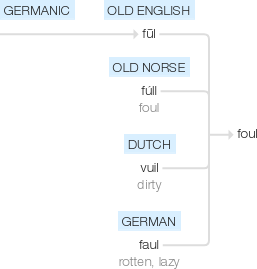Foul
Old English fūl, of Germanic origin; related to Old Norse fúll ‘foul’, Dutch vuil ‘dirty’, and German faul ‘rotten, lazy’, from an Indo-European root shared by Latin pus, Greek puos ‘pus’, and Latin putere ‘to stink’.
wiktionary
From Middle English foul, from Old English fūl(“foul, unclean, impure, vile, corrupt, rotten, guilty”), from Proto-Germanic *fūlaz(“foul, rotten”), from Proto-Indo-European *puH-(“to rot”). Cognate with Dutch vuil(“foul”), German faul(“rotten, putrid”), Danish and Swedish ful(“foul”), and through Indo-European, with Albanian fëlliq(“to make dirty”), Latin puter(“rotten”). More at putrid.
Ancient Greek φαῦλος(phaûlos, “bad”) is a false cognate inasmuch as it is not from the same etymon, instead being cognate to few.
From Middle English foulen, fulen, from Old English fūlian(“to become foul; rot; decay”), from Proto-Germanic *fūlāną(“to rot; decay”).
etymonline
foul (adj.)
Old English ful "rotten, unclean, vile, corrupt, offensive to the senses," from Proto-Germanic *fulaz (source also of Old Saxon and Old Frisian ful, Middle Dutch voul, Dutch vuil, Old High German fül, German faul, Gothic füls), from PIE *pu- (2) "to rot, decay," perhaps from the sound made in reaction to smelling something bad (see pus).
Old English ful occasionally meant "ugly" (as contrasted with fæger (adj.), modern fair (adj.)), and this sense became frequent in Middle English. The cognate in Swedish is the usual word for "ugly." Of weather from mid-14c. In the sporting sense of "irregular, unfair, contrary to established rule or practice" it is first attested 1797, though foul play is recorded from mid-15c. Baseball sense of "out of play" attested by 1860.
foul (v.)
Old English fulian "to become foul, rot, decay," from ful (see foul (adj.)). Transitive meaning "make foul, pollute" is from c. 1200. Meaning "become entangled" (chiefly nautical) is from 1832, probably from foul (adj.) in the sense "obstructed by anything fixed or attached" (late 15c.). "A term generally used in contrast to clear, and implies entangled, embarrassed or contrary to: e.g. to foul the helm, to find steerage impracticable owing to the rudder becoming entangled with rope or other gear" [Sir Geoffrey Callender, "Sea Passages," 1943]. Related: Fouled; fouling. Hence also foul anchor (1769), one with the slack of the cable twisted round the stock or a fluke; noted by 1832 as naval insignia.
